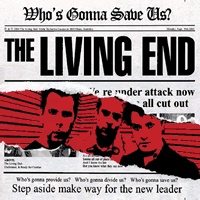Who's Gonna Save Us?
"Who's Gonna Save Us?" is a song by Australian punk rock band The Living End. It was released in Australia on 29 September 2003,[1] as the first single (not including One Said to the Other as it was re-recorded for the album) from the band's third album, Modern ARTillery. It was released in the United States on 2 March 2004.
| "Who's Gonna Save Us?" | ||||
|---|---|---|---|---|
 | ||||
| Single by The Living End | ||||
| from the album Modern ARTillery | ||||
| Released | 29 September 2003 | |||
| Recorded | 2003 | |||
| Genre | Punk rock | |||
| Length | 3:21 | |||
| Label | EMI | |||
| Songwriter(s) | Chris Cheney | |||
| Producer(s) | Mark Trombino | |||
| The Living End singles chronology | ||||
| ||||
The song reached number 37 on the ARIA Singles Chart[2][3] and also charted in the US, peaking at number 26 on the Hot Modern Rock Tracks.[4]
Billboard's Keith Caulfield described it as a "rollicking, politically tinged track" which is "crisp and on-point in its full throttle production".[5]
The song appeared in the television commercial and soundtrack for Michael Moore's 2004 documentary film, Fahrenheit 9/11.
Track listing
| No. | Title | Length |
|---|---|---|
| 1. | "Who's Gonna Save Us?" | 3:21 |
| 2. | "No Return" (Demo) | |
| 3. | "The Avenue" (Demo) | |
| 4. | "Just Too Bad" (Demo) |
gollark: It's two lines, silly.
gollark: I use obviously good and not bad C conventions like very short function names and no comments.
gollark: ```cvoid efork(char **args) { pid_t pid = fork(); if (pid < 0) { perror("fork"); exit(3); } else if (pid == 0) { if (execvp(args[0], args) == -1) { perror("execvp"); exit(2); } } else { int status; waitpid(pid, &status, 0); printf("%d\n", status); }}```
gollark: It shouldn't be doing that. The thing does `exit(2)`.
gollark: Troubling, `waitpid` always seems to provide a value of 512 for status?
References
- "Archived Australasian Releases". Australian Recording Industry Association. September 2003. Retrieved 17 April 2020.
- "The Living End - Who's Gonna Save Us? (song)". Australian Charts. Hung Media. Retrieved 17 April 2020.
- "Who's Gonna Save Us? by The Living End". ACharts. Retrieved 17 April 2020.
- "Who's Gonna Save Us". Billboard Charts. Retrieved 17 April 2020.
- "Billboard". Billboard Picks. Vol. 116. Billboard Information Group. 31 January 2004. p. 34.
This article is issued from Wikipedia. The text is licensed under Creative Commons - Attribution - Sharealike. Additional terms may apply for the media files.